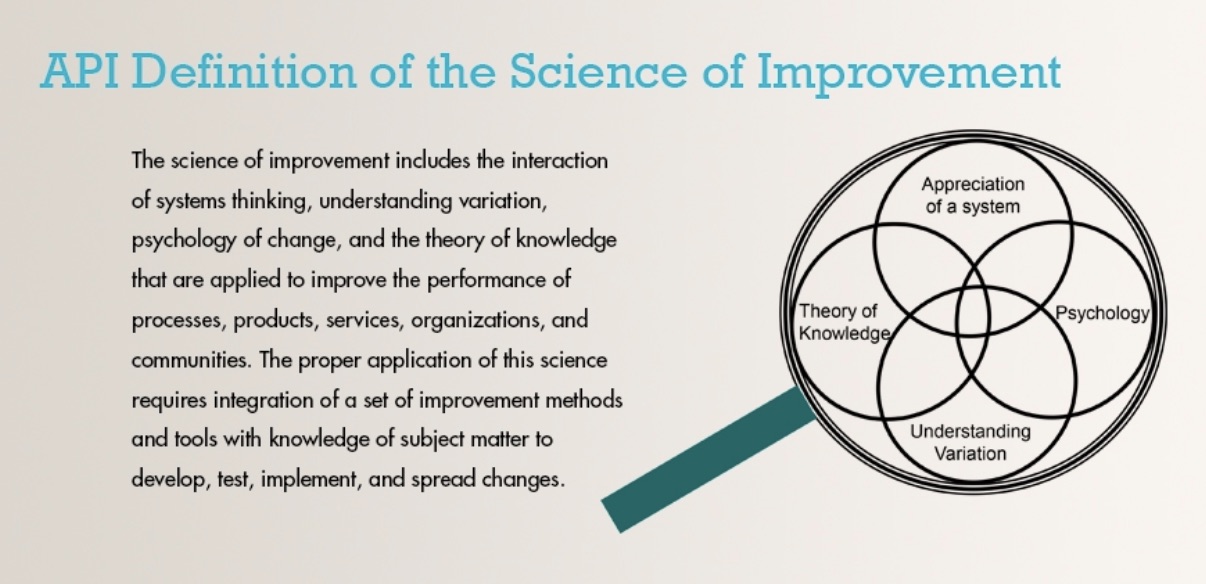As the use of the terms ‘Improvement Science’ or the ‘Science of Improvement’ have spread across health care and education, some ask how it differs or relates to Implementation Science?
While implementation, and the study of it, could apply to any sector, it appears Implementation Science had its genesis in public health. Its roots are in a common challenge…how to take changes we know work and support adoption at scale. The following are operational definitions of Implementation Science.
The BMC Implementation Science journal describes Implementation Science as”
“..the scientific study of methods to promote the systematic uptake of proven clinical treatments, practices, organizational, and management interventions into routine practice, and hence to improve health.”
The Health Foundation (United Kingdom), in a 2011 evidence scan of Improvement Science, defined Implementation Science as…
“Implementation science is the scientific study of methods to promote the integration of research findings and evidence-based interventions into health care policy and practice and hence to improve the quality and effectiveness of health services and care.”
In these operational definitions, common attributes are present. Implementation Science is aimed at studying how to take proven, evidence-based interventions and implement them into policy and practice with an intent to improve quality. It begins with having an intervention one has a high degree of belief works and then studying the approach to hardwiring it.
Absent from the definition are mention of method or theory.
Improvement Science or the Science of Improvement emerged as a term only in the last few decades. Christie et al. do a nice overview in their book Improvement Science in Evaluation. The authors draw the history back to operations research in the 1930s but note the current concept emerged from the Associates in Process Improvement (API) and their collaborations in health care and later education.
In API’s book The Improvement Guide (Ch. 4), the authors describe science as “knowledge gained through study or practice” that blends subject matter knowledge with a body of knowledge framed by W. Edwards Deming as the “System of Profound Knowledge,” which is the interplay of the theories of systems, variation, knowledge, and psychology. API has their operational definition on their website:

Source: http://www.apiweb.org/
To get a deeper appreciation for the foundations of improvement science check out :
This definition is agnostic to industry and is rooted in Dr. Deming’s foundational System of Profound Knowledge. It begins before we have confidence in an intervention and includes developing and testing changes before implementing and spreading those changes. The definition notes the required “integration of a set of improvement methods and tools.” These methods and tools are based in QI.
Not all definitions of improvement science begin with the foundation in Deming’s Profound Knowledge. Some jump to studying the methods and tools and their application. Returning to The Health Foundation’s 2011 evidence scan, the authors used the definition…
“Improvement science focuses on systematically and rigorously exploring ‘what works’ to improve quality in healthcare and the best ways to measure and disseminate this to ensure positive change.”
It’s also common to see the term Improvement Science used as a term to describe the application of improvement tools and methods themselves. People will refer to doing or using improvement science when they mean they are applying tools and methods like the PDSA cycle or time series measurement.
Implementation Science and Improvement Science share an intent to implement and spread successful changes. Improvement Science distinguishes itself through a grounding in the System of Profound Knowledge combined with subject matter expertise to also develop and test change ideas using QI tools and methods in any industry.
—
If this was helpful, share and include me @DaveWilliamsATX. Sign up here to receive a monthly email from me that includes all my blog posts and other Improvement Science resources I think you’d appreciate.
